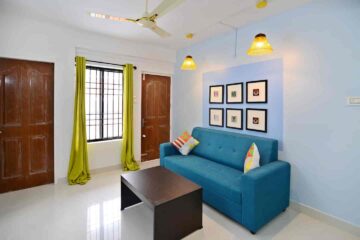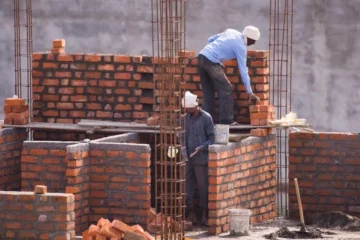 It wasn’t quite Wembley Arena and his guitar was off at times, but Raghav Prabhu finally lived his dream before an appreciative audience of 50-odd neighbours at their senior housing campus last month. Now he’s thinking of starting a band.
It wasn’t quite Wembley Arena and his guitar was off at times, but Raghav Prabhu finally lived his dream before an appreciative audience of 50-odd neighbours at their senior housing campus last month. Now he’s thinking of starting a band.
Growing up in the 1960s, Prabhu, a Beatles fan, deepfroze his passion for music to focus on solving Igor Irodov’s physics problems. An engineering job, then a management position and family never left him time for himself until he retired in 2011 and moved into his retirement nest with his wife. When the campus management hired a guitar instructor, Prabhu was the first to join, and three years on he can play “tolerably well”.
Prabhu and thousands of other senior citizens like him are choosing to play life’s final innings on their own terms, and a host of serviced housing projects are enabling them to live together in a safe, comfortable and hassle-free environment with dignity.
“Throughout our youth and middle age, we focused on career and bringing up children,” said Kamini Bhandari, 67, who retired as a senior manager from TCS and lives in Ashiana Utsav, a seniors-only housing project in Bhiwadi near Delhi. “Now, the time has come for us to live for ourselves.”
Modern senior housing is a world removed from the ‘old-age homes’ of yesteryears where the elderly went to stay because they were heirless and too sick to look after themselves, or unwanted by their children. Far from being a pejorative, it is a lifestyle statement, as is apparent from the mix of residents. Utsav, for instance, houses several retired officers from IAS, IPS and the armed forces, besides many doctors, engineers and teachers.
“We come here to lead our lives to the fullest and do whatever we wanted to do all along,” said another Utsav resident, Professor Y P Khanna.

Realising the expectations of their clients, the managements are adding recreational facilities, including hobby classes. “We have not retired from life but only from our all-consuming professional routines,” said Amita Shaw, 63, who retired as director of Bal Bhavan, New Delhi and heads the dance and singing club at Utsav. “Here we use our experience to make our daily life more fulfilling.”
Sometimes, living in their peer group also means new beginnings. For instance, at a Pune property two residents in their late 60s found their soulmates in each other.
Functional health services with doctors, nursing staff and ambulance are a common feature of seniors-only housing and most have tied up with nearby hospitals for cashless treatment of residents in emergencies. Some even have care homes for residents with Alzheimer’s, dementia, Parkinson’s, arthritis, osteoporosis, etc.
Seniors-only housing—for people aged above 55—took off in India about 15 years ago, and is growing fast. There are about 3,600 occupied homes in 15-odd projects across the country, and more than 5,000 are being built in 20 new projects. While Pune’s Paranjape Group, Bengaluru’s Mantri Group andAshiana Housing in Delhi-NCR are some of the established names, Max Group and Tata Housing have also launched projects in Dehradun and Bengaluru, respectively.
Senior housing is usually developed in the suburbs to keep costs down. Although it is part of a big township, entry is restricted to the residents. Leasing is an option, but most clients buy. Prices range from Rs 23 lakh for a one-bedroom unit to Rs 58 lakh for a three-bedroom unit, in the NCR; Rs 25 lakh to Rs 59 lakh in Pune; Rs 39 lakh to Rs 90 lakh in Bengaluru; Rs 30 lakh to Rs 70 lakh in Chennai, and Rs 25 lakh to Rs 1.18 crore in Coimbatore. Now, Lavasa, too, is offering senior homes priced from Rs 45 lakh to Rs 1.45 crore.
Max India offers units in its Antara Senior Living project in Dehradun on a lifelong lease model, at rates ranging from Rs 1.7 crore for a one-bedroom unit to Rs 7 crore for a three-bedroomunit with staff accommodation. The lease is renewable by the heirs of the original residents, and while they can exit at the market value, new buyers have to be approved by the management.
Cleaning, mopping and housekeeping of the homes, besides maintenance of the common areas and health clinic are covered in the monthly charges that vary from Rs 2,500 for Ashiana’s smallest unit to Rs 70,000 for top-end accommodation at Antara. Paranjape Group takes a Rs 8 lakh deposit instead of monthly charges.
Although all senior housing units come with kitchens, the managements also run canteens.
Shashank Paranjape, MD of Paranjape Schemes, said they aim to keep the residents happy and engaged. The group has even started training event managers for senior living homes. “Apart from an understanding of real estate, hospitality and nursing, a senior living venture requires community building with care and passion,” Paranjape said.
Sushil Mantri, CMD of Bengaluru-based Mantri Developers that runs the senior homes project Primus Eden, said, “Housing for senior citizens is much more than a real estate business.” The company is using its knowledge and experience of the hospitality sector to cater to the needs of its elderly clients.
“Hospitality business provides only catering and accommodation for a short time. In retirement communities, you get a plethora of services and they are not restricted to catering. Also, the qualifications and training of the staff are vastly different from that of the hospitality sector,” said Colonel (retired) A Sridhar, who started Covai Property Centre in Coimbatore, in 2001.
India has 7.6 crore senior citizens — well over UK’s population of 6.5 crore — and this is expected to swell to 17.3 crore by 2025. Providing housing that addresses the special needs of the elderly will be a big challenge.
[Source:- The Economic Times]




